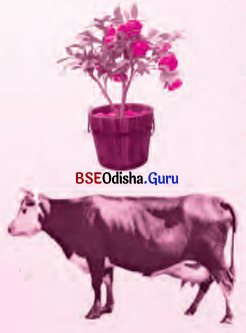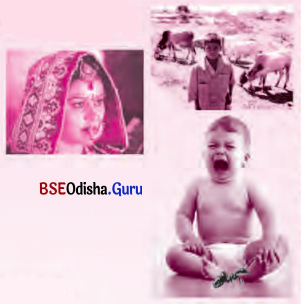Odisha State Board BSE Odisha 6th Class English Solutions Follow-Up Lesson 3 My Story is Said Textbook Exercise Questions and Answers.
BSE Odisha Class 6 English Solutions Follow-Up Lesson 3 My Story is Said
BSE Odisha 6th Class English Follow-Up Lesson 3 My Story is Said Text Book Questions and Answers
Session 1 (ସୋପାନ- ୧):
I. Pre-Reading (ପଢ଼ିବା ପୂର୍ବରୁ):
→ Socialisation (ସାମାଜିକୀକରଣ):
→ You can think of a pre-reading activity by linking this with the main lesson or from the picture.
(ତୁମେ ଏକ ପଢ଼ିବା ପୂର୍ବବର୍ତ୍ତୀ କାର୍ଯ୍ୟ ବିଷୟରେ ଚିନ୍ତା କରିପାର – ହୁଏତ ଏହାକୁ ମୁଖ୍ୟ ବିଷୟ ସହ ସଂଯୁକ୍ତ କରି କିମ୍ବା ଛବିରୁ ।)
II. While-Reading (ପଢ଼ିବା ସମୟରେ):
- Follow the steps of the main lesson.
(ମୁଖ୍ୟ ପାଠର ସୋପାନଗୁଡ଼ିକୁ ଅନୁସରଣ କର ।) - Read the following chain poem translated from Odia. This poem is generally sung when a story ends.
(ଓଡ଼ିଆରୁ ଅନୁବାଦ ହୋଇଥିବା ନିମ୍ନଲିଖ୍ ଶିକୁଳି କବିତାଟିକୁ ପଢ଼ । ଏହି କବିତାଟି ସାଧାରଣତଃ ବୋଲାଯାଏ ଯେତେବେଳେ ଗୋଟିଏ ଗପ ଶେଷ ହୋଇଯାଏ ।)
![]()
TEXT (ବିଷୟବସ୍ତୁ):

1. My story is said
The flowering plant is dead.
2. O flowering plant! why did you die ?
The black cow ate me up and made me lie.
3. O black cow! why did the plant you eat?
Because the cowherd did not well me treat.
4. O cowherd! why didn’t you well the cow treat to eat?
The daughter-in-law did not give me food.
5. O daughter-in-law ! why didn’t you give food, why?
Because my little baby did cry.

6. O little baby! why did you cry?
The ant bit me, that is why.
7. O ant! why did you bite the little child?
Under the soil I hide
And bite soft flesh when I do find.
କବିତାର ଓଡ଼ିଆ ଉଚ୍ଚାରଣ:
1. ମାଇଁ ଷ୍ଟୋରି ଇଜ୍ ସେଡ୍
ଦି ଫ୍ଲାୱାରିଙ୍ଗ୍ ପ୍ଲାଣ୍ଟ୍ ଇଜ୍ ଡେଡ୍ ।
2. ଓ ଫ୍ଲାୱାରିଙ୍ଗ୍ ପ୍ଲାଣ୍ଟ ! ହୁଏ ଡିଡ଼୍ ଇୟୁ ଡାଏ ?
ଦି ବ୍ଲାକ୍ କାଓ ଏଟ୍ ମି ଅପ୍ ଆଣ୍ଡ ମେଡ଼୍ ମି ଲାଏ ।
3. ଓ ବ୍ଲାକ୍ କାଓ ! ହ୍ଵାଏ ଡିଡ୍ ଦ’ ପ୍ଲାଣ୍ଟ୍ ଇୟୁ ଇଟ୍ ?
ବିକଜ୍ ଦ’ କାଓହଡ଼୍ ଡିଡ଼୍ ନଟ୍ ୱେଲ୍ ମି ଟ୍ରିଟ୍ ।
4. ଓ କାଓହଡ଼ ! ହ୍ବାଏ ଡିଡ଼ିଣ୍ଟ୍ ଇୟୁ ୱେଲ୍ ଦ’ କାଓ ଟ୍ରିଟ୍ ଟୁ ଇଟ୍ ?
ଦି ଡଟର୍-ଇନ୍-ଲ୍ ଡିଡ୍ ନଟ୍ ଗିଭ୍ ମି ଫୁଡ୍ ।
5. ଓ ଡଟର୍-ଇନ୍-ଲ୍ ! ହ୍ବାଏ ଡିଡ଼ିଣ୍ଟ୍ ଇୟୁ ଗିଭ୍ ଫୁଡ୍, ଦ୍ଵାଏ ?
ବିକଜ୍ ମାଇଁ ଲିଟିଲ୍ ବେବି ଡିଡ଼୍ କ୍ରାଏ ।
6. ଓ ଲିଟିଲ୍ ବେବି ! ହୁଏ ଡିଡ଼୍ ଇୟୁ କ୍ରାଏ ?
ଦି ଆଣ୍ଡ୍ ବିଟ୍ ମି, ଦ୍ୟାଟ୍ ଇଜ୍ ହୁଏ ।
7. ଓ ଆଣ୍ଡ୍ ! ହୁଏ ଡିଡ୍ ଇୟୁ ବାଇଟ୍ ଦ’ ଲିଟିଲ୍ ଚାଇଲ୍ଡ୍ ?
ଅଣ୍ଡର୍ ଦ’ ସିଏଲ୍ ଆଇ ହାଇଡ଼୍
ଆଣ୍ଡ୍ ବାଇଟ୍ ସଫ୍ଟ ପ୍ଲେସ୍ ସ୍ପେନ୍ ଆଈ ଡୁ ଫାଇଣ୍ଡ୍ ।
![]()
କବିତାର ସାରକଥା | ଓଡ଼ିଆ ଅନୁବାଦ:
୧। ମୋ ଗପଟି କୁହା ସରିଲା
ଫୁଲଗଛଟି ମରିଗଲା ।
୨। ହେ ଫୁଲଗଛ ! ତୁ କାହିଁକି ମରିଗଲୁ ?
କାଳୀଗାଈଟା ମୋତେ ଖାଇଦେଲା ଏବଂ ମୋତେ ତଳେ ପକାଇ ଦେଲା ।
୩ । ହେ କାଳୀଗାଈ ! ଫୁଲଗଛଟିକୁ ତୁ କାହିଁକି ଖାଇଦେଲୁ ?
କାରଣ ଗାଈ ଜଗୁଆଳିଟା ମୋ’ର ଖାଇବା ପିଇବା ବୁଝିଲା ନାହିଁ ।
୪ । ହେ ଗାଈ ଜଗୁଆଳି ! ତୁ କାହିଁକି ଗାଈର ଭଲ ଯତ୍ନ ନେଲୁ ନାହିଁ ଓ ତାକୁ ଖାଇବାକୁ ଦେଲୁନି ?
ବୋହୂଟା ମୋତେ ଖାଦ୍ୟ ଦେଲା ନାହିଁ ।
୫ । ହେ ବୋହୂ ! ତୁ କାହିଁକି ଖାଦ୍ୟ ଦେଲୁନି, କାହିଁକି ?
କାରଣ ମୋ ଛୋଟ ଛୁଆଟି କାନ୍ଦିଲା ।
୬ । ହେ ଛୋଟ ଛୁଆ ! ତୁ କାହିଁକି କାନ୍ଦିଲୁ ?
ପିମ୍ପୁଡ଼ିଟା ମୋତେ କାମୁଡ଼ି ଦେଲା, ସେଇଥପାଇଁ।
୭ | ହେ ପିମ୍ପୁଡ଼ି ! ତୁ କାହିଁକି ଛୋଟ ଛୁଆଟିକୁ କାମୁଡ଼ି ଦେଲୁ ?
ମୁଁ ମାଟିତଳେ ଲୁଚିଥାଏ
ଏବଂ ଯେତେବେଳେ ମୁଁ ନରମ ମାଂସ ପାଏ କାମୁଡ଼ିଦିଏ ।
Session – 2 (ସୋପାନ – ୨):
III. Post-Reading (ପଢ଼ିସାରିବା ପରେ):
1. Writing (ଲେଖୁ ):
(a) Answer the following questions.
(ନିମ୍ନଲିଖୂତ ପ୍ରଶ୍ନଗୁଡ଼ିକର ଉତ୍ତର ଦିଅ ।)
(i) What language is this poem from ?
(କେଉଁ ଭାଷାରୁ ଏହି କବିତାଟି ଆସିଛି ?)
Answer:
This poem is from the Odia language.
(ii) When is this song normally sung?
(ସାଧାରଣତଃ କେତେବେଳେ ଏହି ଗୀତଟି ବୋଲାଯାଏ ? )
Answer:
This song is normally sung when a story ends.
(iii) Why was the flowering plant dead?
(କାହିଁକି ଫୁଲଗଛଟି ମରିଗଲା ?)
The ____________________________________dead because
_________________________________________
_________________________________________
Answer:
The flowering plant was dead because the black cow ate it up and made it lie.
![]()
(iv) Why did the cow eat up the flowering plant?
(ଗାଈ କାହିଁକି ଫୁଲଚାରାଟିକୁ ଖାଇଦେଲା ?)
Ans. The cow ate up the flowering plant because the cowherd did not treat the cow well.
Word Note (ଶବ୍ଦାର୍ଥ):
(The words/phrases have been defined mostly on contextual meanings.)
(ଶବ୍ଦ । ଖଣ୍ଡବାକ୍ୟଗୁଡ଼ିକ ଅଧିକାଂଶତଃ ପ୍ରସଙ୍ଗଗତ ଅର୍ଥ ଉପରେ ନିର୍ଭର କରି ବ୍ୟାଖ୍ୟା କରାଯାଇଛି।)
battle — fight, ଯୁଦ୍ଧ
bite — cut with teeth, କାମୁଡିବା
cowherd — one who looks after cows, ଗାଈ ଜଗୁଆଳି
kingdom — country ruled by a king, ରାଜ୍ୟ
look after — take care of, ଯତ୍ନ ନେବା, ଦେଖାଶୁଣା କରିବା
nail — metal nail for fixing horse-shoe, ଲୁହାକଣ୍ଟା
rider — (here) the person who rides a horse, ଆରୋହୀ |
shoe nail — horse shoe nail, ଘୋଡ଼ା ନାଲ
treat — caring, feeding, ଯତ୍ନ ନେବା, ଖାଇବା ପିଇବା ବୁଝିବା
daughter-in-law — the wife of the son, ବୋହୂ ବା ବଧୂ
hide — ଲୁଚାନ୍ତୁ |
bite — କାମୁଡିବା
soft — ନରମ
flesh — ମାଂସ
lie — ମିଛ କହିବା
die — ମର
dead — ମୃତ
bit — ବିଟ୍
lost — ହଜିଯାଇଛି |
